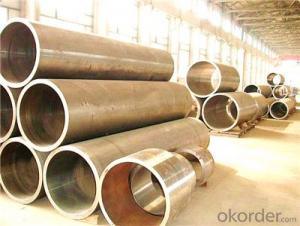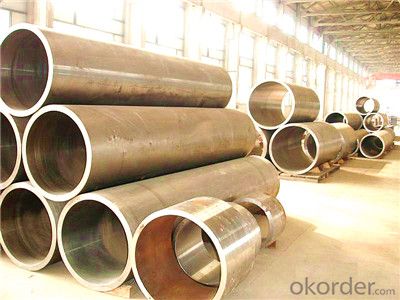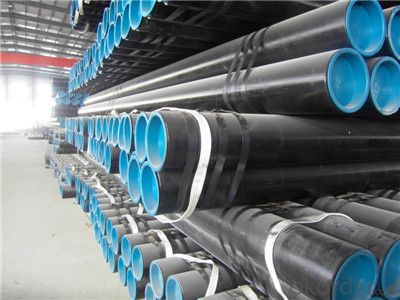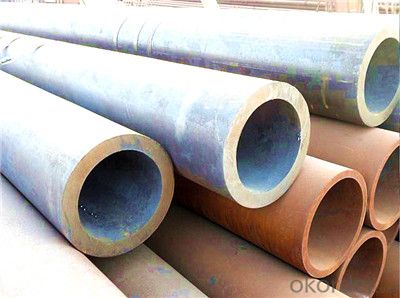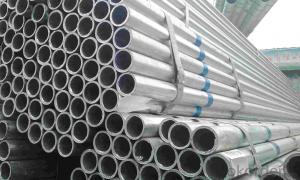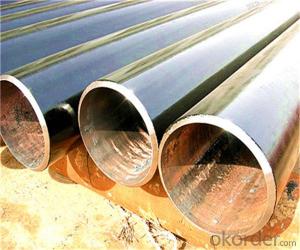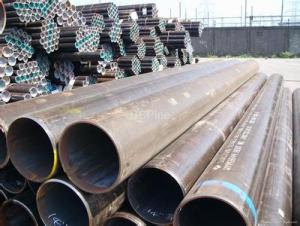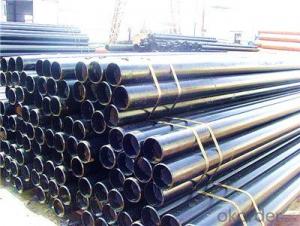Seamless Steel Pipe with High Quality from Factory Price
- Loading Port:
- Tianjin
- Payment Terms:
- TT OR LC
- Min Order Qty:
- 50 m.t.
- Supply Capability:
- 3000000 m.t./month
OKorder Service Pledge
OKorder Financial Service
You Might Also Like
PRODUCT DETAILS
1.Structure of Seamless Steel Pipe Description:
A large amount of Seamless Steel Pipes is offered to the clients at cost effective rates. These pipes are extremely durable, resistant to corrosion and have high tensile strength. Our pipes are used in nuclear plants, power plants, refineries and construction industry across the country. Furthermore, we are capable of providing these seamless pipes to the clients in bulk quantity.
2.Main Features of the Steel Pipe:
• High manufacturing accuracy
• High strength
• Small inertia resistance
• Strong heat dissipation ability
• Good visual effect
•Reasonable price
3.Packaging & Delivery:
| Packaging Details: | Seaworthy packages, bundles wrapped with strong steel strip |
| Delivery Detail: | 15-30 days after received 30% TT |
4.Seamless Steel Pipe Specification:
| Standard: | GB, DIN, ASTM,ASME, ASTM A106-2006, ASTM A53-2007 |
| Grade: | 10#,20#, 45#, 16Mn |
Thickness: | 8 - 33 mm |
| Section Shape: | Round |
| Outer Diameter: | 133 - 219 mm |
| Place of Origin: | Shandong, China (Mainland) |
| Secondary Or Not: | Non-secondary |
| Application: | Hydraulic Pipe |
| Technique: | Cold Drawn |
| Certification: | API |
| Surface Treatment: | factory state or painted black |
| Special Pipe: | API Pipe |
| Alloy Or Not: | Non-alloy |
| Length: | 5-12M |
| Outer Diameter: | 21.3-610mm |
5.FAQ of Seamless steel pipe:
①How is the quality of your products?
Our products are manufactured strictly according to national and internaional standard, and we take a test
on every pipe before delivered out. If you want see our quality certifications and all kinds of testing report, please just ask us for it.
Guaranteed: If products’ quality don’t accord to discription as we give or the promise before you place order, we promise 100% refund.
②How about price?
Yes, we are factory and be able to give you lowest price below market one, and we have a policy that “ for saving time and absolutely honest business attitude, we quote as lowest as possible for any customer, and discount can be given according to quantity”,if you like bargain and factory price is not low enough as you think, just don’t waste your time.Please trust the quotation we would give you, it is professional one.
③Why should you chose us?
Chose happens because of quality, then price, We can give you both.Additionally, we can also offer professional products inquiry, products knowledge train(for agents), smooth goods delivery, exellent customer solution proposals.Our service formula: good quality+good price+good service=customer’s trust.
SGS test is available, customer inspection before shipping is welcome, third party inspection is no problem.
Any question, pls feel free to contact us !
- Q: Can steel pipes be used for oil drilling operations?
- Yes, steel pipes are commonly used for oil drilling operations. They possess the necessary strength and durability to withstand the harsh conditions of drilling and transporting oil. Additionally, steel pipes have excellent corrosion resistance, making them suitable for long-term use in the oil and gas industry.
- Q: What are the non-destructive testing methods used for steel pipes?
- Some of the non-destructive testing methods used for steel pipes include ultrasonic testing, magnetic particle testing, liquid penetrant testing, radiographic testing, and eddy current testing.
- Q: How are steel pipes used in the oil and gas industry?
- Steel pipes are widely used in the oil and gas industry for various purposes. They are primarily used for transporting oil and gas from production sites to refineries and distribution centers. These pipes are known for their strength, durability, and resistance to corrosion, making them ideal for handling the high-pressure and corrosive nature of oil and gas fluids. Steel pipes are also used in drilling operations as casing and tubing to maintain the integrity of the wellbore and prevent any leakage. Additionally, steel pipes are utilized in the construction of oil and gas infrastructure such as pipelines, storage tanks, and offshore platforms, ensuring the safe and efficient transportation and storage of oil and gas resources.
- Q: Can steel pipes be used for the construction of railway tracks?
- No, steel pipes cannot be used for the construction of railway tracks. Railway tracks require specially designed rails made of steel, which are laid on sleepers or ties and secured with fasteners to provide stability and support for trains. Steel pipes do not possess the necessary shape or strength required for this purpose.
- Q: How are steel pipes used in the construction of bridges?
- Steel pipes are commonly used in the construction of bridges for various purposes such as supporting the bridge structure, providing stability, and facilitating the passage of fluids like water or gases. Steel pipes are used as piers or piles to support the weight of the bridge, acting as strong and durable foundations. They are also used for constructing the bridge's framework, such as beams and trusses, which provide the necessary strength and load-bearing capacity. Additionally, steel pipes may be used as conduits for utilities like water, gas, or electrical cables, allowing for efficient transportation across the bridge.
- Q: What are the applications of galvanized steel pipes?
- Galvanized steel pipes have numerous applications in various industries. They are commonly used for plumbing and water supply systems due to their corrosion resistance. Additionally, they are used in gas transmission, oil refineries, and industrial plants where resistance to harsh chemicals and high temperatures is crucial. Galvanized steel pipes are also employed in construction for structural support and scaffolding, as well as for fencing and handrails. Overall, their durability, strength, and cost-effectiveness make galvanized steel pipes suitable for a wide range of applications.
- Q: How are steel pipes protected against microbial corrosion?
- Steel pipes are protected against microbial corrosion through various methods. One common method is the use of coatings on the pipe's surface. These coatings act as a barrier between the steel and the surrounding environment, preventing the entry of microbes and their corrosive byproducts. Coatings such as epoxy, polyethylene, and fusion bonded epoxy are often applied to the pipes to provide this protection. Another method is the use of corrosion inhibitors. These inhibitors are added to the fluid flowing through the pipe to inhibit microbial growth and prevent corrosion. These inhibitors can be organic or inorganic compounds that work by either killing the microbes or inhibiting their metabolic activity. Additionally, proper maintenance and cleaning of the pipes are crucial in preventing microbial corrosion. Regular inspections and cleaning can help remove any biofilms or microbial deposits that may have formed on the pipe's surface. This reduces the potential for microbial corrosion and extends the lifespan of the pipes. In some cases, cathodic protection may also be employed. This involves the use of sacrificial anodes or impressed current systems to provide a protective electrical current to the pipe. This current helps to prevent the formation of corrosive microorganisms and protects the steel from corrosion. Overall, a combination of coatings, corrosion inhibitors, regular maintenance, and cathodic protection techniques are used to protect steel pipes against microbial corrosion. These strategies help to ensure the longevity and integrity of the pipes in various industries, such as oil and gas, water supply, and sewage systems.
- Q: Can steel pipes be used for chemical storage tanks?
- No, steel pipes are not suitable for chemical storage tanks as they are not designed to handle the corrosive nature of many chemicals.
- Q: What are the factors to consider while selecting steel pipes for a project?
- When choosing steel pipes for a project, there are several key factors to take into account. These factors encompass the material composition of the steel, the dimensions of the pipes, the intended use, the environmental conditions, and the allocated budget. Firstly, the material composition of the steel pipes plays a vital role in determining their strength, resistance to corrosion, and overall durability. Carbon steel, stainless steel, and alloy steel are commonly used types of steel for pipes, each possessing unique characteristics suitable for different applications. Secondly, the dimensions of the pipes, including diameter and wall thickness, should be carefully considered. It is crucial to ensure that these dimensions align with the project requirements and the system in which the pipes will be installed. This ensures that the selected pipes can effectively handle the required flow rates and pressures. Thirdly, thorough assessment of the intended application of the steel pipes is necessary. Different projects may demand pipes with specific features, such as heat resistance, pressure resistance, or the ability to transport particular substances like gas, oil, or water. Understanding these application requirements aids in selecting the appropriate type of steel pipes. Evaluation of the environmental conditions in which the pipes will be installed is also important. Factors such as temperature fluctuations, exposure to moisture, corrosive substances, and external pressures must be taken into account. For example, if the project involves underground installation or exposure to corrosive chemicals, corrosion-resistant steel pipes may be necessary. Lastly, the allocated budget for the project is a significant consideration. The cost of steel pipes can vary depending on their material composition, dimensions, and additional features. Striking a balance between project requirements and available budget ensures cost-effectiveness without compromising the quality and performance of the pipes. In conclusion, the selection of steel pipes for a project necessitates careful consideration of factors including material composition, pipe dimensions, intended application, environmental conditions, and budget. By thoroughly evaluating these factors, one can choose the most suitable steel pipes that meet project requirements, ensuring long-term performance and durability.
- Q: What is the role of steel pipes in the construction of bridges?
- The role of steel pipes in the construction of bridges is primarily to provide structural support and stability. Steel pipes are commonly used in bridge construction to form the framework and support the weight of the bridge deck and other components. They are also used to carry various utilities such as water, gas, and electricity across the bridge. Additionally, steel pipes are durable, resistant to corrosion, and have high strength-to-weight ratio, making them an ideal choice for constructing bridges that can withstand heavy loads and harsh environmental conditions.
Send your message to us
Seamless Steel Pipe with High Quality from Factory Price
- Loading Port:
- Tianjin
- Payment Terms:
- TT OR LC
- Min Order Qty:
- 50 m.t.
- Supply Capability:
- 3000000 m.t./month
OKorder Service Pledge
OKorder Financial Service
Similar products
Hot products
Hot Searches
Related keywords
